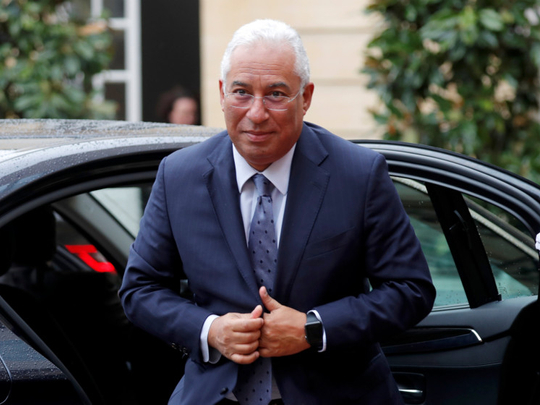
If you think about Portugal, it’s hard to come up with a scandal or crime that has made headlines.
Yes, perhaps its most famous footballing son, Cristiano Ronaldo, is occasionally guilty of playacting and rolling about in agony for too long, but that’s as far as Portuguese transgressions go. Well ... maybe not, if you include it winning the annual Eurovision pop fest this year with Salvador Sobral crooning to victory with Amar Pelos Dois — To Love Both. In fairness, though, the made-for-television song contest is in its 62nd year of committing crimes against humanity.
But this year, Portugal suffered its worst forest fires in decades, with more than 60 people killed in blazes that swept across swaths of the nation that occupied the south west portion of the Iberian land mass occupied by Spain.
The Portuguese government was criticised for its slow reaction to the summer fires. The nation’s 5,000 full-time firefighters, augmented by 25,000 volunteers, were simply overwhelmed by the size of the blazes. Depopulation and an ageing demography in rural areas meant that large areas of forestry went untended. Soaring summer temperatures and a drought didn’t help — nor the fact too that the forests were made up of eucalyptus trees. The species grow twice as quick as pines, is good for making paper but has an oil that burns fiercely when forest fires spread.
Despite the criticism, the government of Prime Minister Antonio Costa weathered the firestorms and is in control of a nation that has the third-highest public debt-to-gross domestic product ratio in the European Union (EU). Greece tops the list at 180.8 per cent, then comes Italy at 132 per cent, and then the Lisbon government at 130.1 per cent. It’s a level of debt that worries economists, but not bad enough that the fiscal firefighters have to be called in again.
But when it comes to diplomacy, nobody is able to keep up with Portugal and its hitting above its weight on the global stage.
Portugal is a diplomatic superpower.
On January 1, Antonio Guterres was sworn in as the Secretary-General of the United Nations. He had served as a socialist prime minister of Portugal at the turn of the millennium before spending a decade as the United Nations High Commissioner for Refugees.
And despite Portugal’s high debt-to-GDP ratio, Mario Centeno, Portugal’s Minister for Finance, takes over the helm of the Eurogroup — the collective name for the group of 19 members that use the euro as a common currency. The thinking must be that if anyone knows all too well the problems faced by weaker Eurozone nations, it’s a finance minister from a nation that is almost a basket case itself. The vice-president of the European Central Bank (ECB) is also Portuguese.
Centano comes from a nation that has been bailed out three times over the past four decades since the end of the rule of dictator Antonio de Oliveira Salazar. Indeed, following the financial crisis, for three years, Portugal’s finances and fiscal policy were largely controlled and overseen by the so-called troika of the ECB, the European Union and the International Monetary Fund.
“We have gone from being an ugly duckling to being a radiant swan,” Costa, the Prime Minister recently noted on his nation’s string of diplomatic coups. Maybe, but the answer is simpler: Powerful people in powerful nations are not afraid of a small nation that never seems to offend anyone.
That’s a sentiment picked up by the Mayor of Lisbon, Fernando Medina recently. “We don’t bother anybody,” he said. “Everyone is welcome in our country, nobody refuses to speak with us. It may seem strange, but in the world we live in, being received with open arms has become very important.”
This reality has been used by the Portuguese diplomatic corps to effect. Guterres’ successor as prime minister, Durao Barosso, led the European Commission for a decade after losing the support of the socialists and the broader Portuguese electorate.
While Portugal was a founding member of the North Atlantic Treaty Organisation, its poor economic performance has hampered its ability to maintain funding pledges, and is one of a long list of nations in the alliance that were called out by incoming United States President Donald Trump last spring for failing to meet its funding commitments. Either way, Lisbon is hardly a threat, and its Azores islands, far out into the Atlantic, are home to some 2,100 US servicemen at Lajes airfield. The distance between there and New York is shorter than between Los Angeles and Pearl Harbor.
Portugal also draws diplomatic strength from the fact that it a non-Spanish speaking nation, though one that only borders Spain. Its former colonial past, one that was divested when Salazar’s dictatorship ended, gives in influence across broad swaths of Africa, and in South America too, where Portuguese-speaking Brazil mostly dominates economically. And with China, Lisbon too holds some sway, handing back Hong Kong’s neighbouring former colony and gambling outpost Macau in 1999.
It’s other former colonial outposts — including Goa in India and Malacca — give Lisbon at least a diplomatic leg-up against the premier league of nations vying to fill key international posts. Portugal may not be everyone’s first choice, but it is always an agreeable second.









